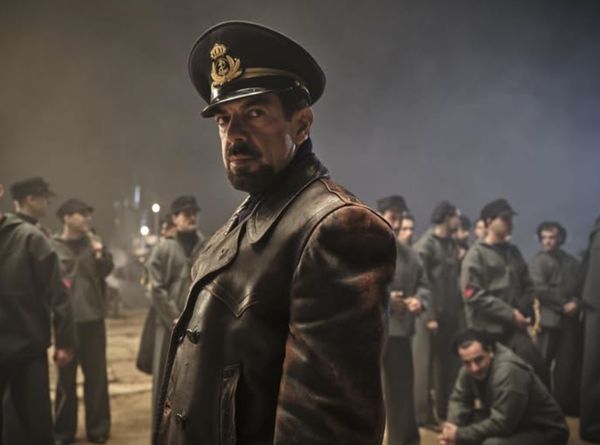 |
| Pierfrancesco Favino as submarine Commander Salvatore Todaro in Edoardo De Angelis’s intense and humanistic Comandante |
Edoardo De Angelis’s Comandante, starring Pierfrancesco Favino, was the Opening Night selection of the 23rd edition of Cinecittà and Film at Lincoln Center’s exceptional program, Open Roads: New Italian Cinema in New York. Other highlights included Ginevra Elkann’s I Told You So (Te l’Avevo Detto with Valeria Bruni Tedeschi, Valeria Golino, Alba Rohrwacher, Riccardo Scamarcio, Danny Huston); Giorgio Diritti’s Lubo (Franz Rogowski); Roberta Torre’s In the Mirror (Mi Fanno Male I Capelli with Alba Rohrwacher mirroring Monica Vitti); Piero Messina’s Another End (Gael García Bernal, Renate Reinsve, Bérénice Bejo); Stefano Sollima’s Adagio (Pierfrancesco Favino, Valerio Mastandrea, Adriano Giannini, Toni Servillo); Laura Luchetti’s The Beautiful Summer (La Bella Estate with Deva Cassel, Yile Yara Vianello, Nicolas Maupas); Nanni Moretti’s A Brighter Tomorrow (Il Sol Dell’Avvenire with Nanni, Margherita Buy, Silvio Orlando, Mathieu Amalric), and Paola Cortellesi’s There’s Still Tomorrow (C’è Ancora Domani with Cortellesi and Valerio Mastandrea).
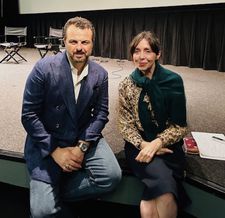 |
| Edoardo De Angelis with Anne-Katrin Titze on his co-writer: “Sandro Veronesi and I are very obsessed by lists. Because in a list there’s a link to prayer.” |
Comandante tells the important story of Second World War submarine Commander Salvatore Todaro, who saved 26 “enemy” sailors from drowning. Pierfrancesco Favino is superb as Todaro, manifesting him as a true hero, whose humanity makes him a role model to this day. De Angelis sets the tone with a quote about Russian shipwreck survivors being rescued by a Ukrainian commander - in 2023 - before taking us back in time to the Italian Royal Navy Arsenal in late September 1940.
Todaro, born in Sicily, grew up in Sottomarina, a seaside town a lagoon away from Venice. He was a man of the sea. “We sink enemy iron, but men we save” is his maxim and while being plagued by premonitions, he and his men hold steady in their ship, a “corset of iron,” as well as a “true melting pot.” He writes to his wife about the crew and how they are “all of Italy” but how the distinct regions and beliefs don’t separate them anymore.
Food turns sparse and the men fantasise about special dishes of home and connect through the words alone (over the end credits you can hear a long list of all your favourite Italian dishes and many a new one). When the rescued Belgians come onboard, tensions are circumvented and bonding takes place over a new potato recipe the Italian cook never heard of.
Why save those not on your side from drowning? “Thus it has always been done at sea. Those who don’t will be cursed,” Todaro knows. Seven days after the ship sunk, Belgium entered the war alongside Britain. The British commander, who ordered ceasefire after having been informed of the rescue by Todaro’s submarine sums it up: “Today we and our enemies saved ourselves.”
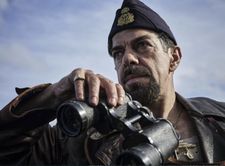 |
| Edoardo De Angelis on Salvatore Todaro (Pierfrancesco Favino) and doing the right thing: “It’s a matter of reality. This man really did it. So if more men can do that …” |
From inside Film at Lincoln Center’s chilly Walter Reade Theater, Edoardo De Angelis joined me for an in-depth conversation on Comandante, Todaro’s roots in Sottomarina, his love for the sea, and opposition to Admiral Karl Dönitz, the strong connections to the present, peace through food and how lists are like prayers.
Anne-Katrin Titze: How did the opening go for you last night?
Edoardo De Angelis: It was wonderful, very warm. I mean the people, not the air conditioning! (We are sitting in a freezing cold Walter Reade Theater).
AKT: Your film was the opening night in Venice last year, which is a great honour. Was it partly because Salvatore Todaro was connected to Chioggia, right around the lagoon?
EDA: I don’t know, you would have to ask [Venice Film Festival Director] Alberto Barbera!
AKT: I am asking because there is a personal connection for me. At one point in your film, your protagonist says he is dreaming of Sottomarina, which is right there.
EDA: Yes, Sottomarina and Chioggia are close.
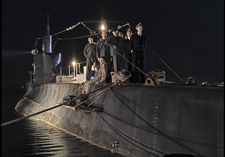 |
| Edoardo De Angelis: “I never thought to make a war movie. I did it just because I discovered this story.” |
AKT: Friends of my parents had a hotel by the beach in Sottomarina and I remember spending time in the summers there, from being two or three years old onwards.
EDA: Oh really?
AKT: When I was little, maybe five, I remember vividly that the local fishermen took me out early in the morning on their boat. They impressed me very much and I thought some of the rules of the sea, the honour of being part of the sea and the respect, also found its way into your film. There’s a certain code of honour you have as a seaman.
EDA: It’s interesting! This memory is interesting. Because even Salvatore Todaro has memories like this. I read it in his biographies. He learned this love exactly up there in Sottomarina. Because he was born in Sicily but they moved to the North of Italy, so he grew up over there. And I’m sure that in these days, growing up as a child with the fishermen, going to school by the boats, he learned this love. So this is a very connected memory to this story.
AKT: It took me by surprise when he mentions the place in the middle of the film. Of course the film is also very much of the now. A Captain who saves enemy sailors on a merchant ship. We are living in a time where people are so divided and friends don’t even help friends. Was it that core of humanity that made you want to tell this story?
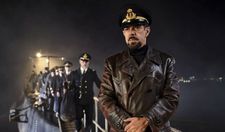 |
| On board the Capellini in Comandante |
EDA: Yeah, this part attracted me to the story. Above all because we live in a world in which we forgot Nuremberg. We forgot that a court decided that after the Second World War, even during wars people were not allowed anymore to commit crimes against humanity, to commit warcrimes. But it’s happening every day in every conflict that now we know. I started to work on this movie before these conflicts, it was happening in peace time. Governments in peace time decided to let people die in the middle of the sea. People without weapons, people that cannot hurt anyone. They decided to let them die just for strange political reasons.
I saw that it was happening not only in my country, but even in your country, under another President, whom the jury just yesterday found guilty. Because history always finds the guilty. Salvatore Todaro was in contrast with Karl Dönitz, who was the Chief of all the operations in the Atlantic Ocean. Because for the German people, a submarine was to shoot and then to disappear. Those were the rules of the war, the rules of engagement.
AKT: Admiral Dönitz made those rules?
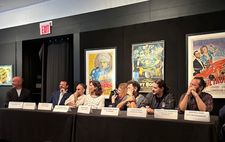 |
| Open Roads: New Italian Cinema panel Photo: Anne Katrin Titze |
EDA: He established that these were the rules of engagement for submarines, to strike and then disappear. And Todaro decided to not follow those rules. But after Nuremberg, Todaro got the Gold Medal of military honour and Karl Dönitz was condemned to ten years. I’m making this point because I think history will ultimately condemn or convict people. We saw this in the past. But it would be great if the conviction could happen at the time the crimes were taking place.
AKT: You can’t help but think that history will look back at us now and make the right judgements. Your film is hopeful in that sense.
EDA: Yes, but, you know, it’s not a matter of hope. My previous movie was The Vice of Hope. I think hope could be a vice. It’s a matter of reality. This man really did it. So if more men can do that …
AKT: Right!
EDA: Every man and woman in history can do the right thing. It’s possible, it’s normal. It’s not anything heroic.
AKT: The quote you start the film with is from 2023! Speaking of Russia and Ukraine.
 |
| Open Roads: New Italian Cinema poster Photo: Anne Katrin Titze |
EDA: Because during the editing I discovered this chronicle. And it’s so emblematic for the story that we are trying to tell! Because every historical movie needs to be connected to the present. Otherwise what is it? Archeology! I’m not interested in it. I’m interested to find emblematic stories that are connected with my present, with my sisters and brothers’ present.
AKT: More than submarine tales. But did you watch other submarine movies in preparation? Das Boot, for instance?
EDA: Yeah, sure, that’s the cult German movie! And De Robertis movies, which are neo-realistic movies. There were propaganda movies that were shot during the war with real submarines and real marines, but the director was Roberto Rossellini, so we can find an aesthetic connection between the De Robertis movies, who is a military man, and the neorealism after the war.
AKT: That’s interesting. Did you happen to see The Wolf’s Call by Antonin Baudry?
EDA: No!
AKT: It’s more recent, with a big focus on sounds and submarines in the present. Antonin told me that in preparation, he watched a lot of submarine movies with Claude Lanzmann, who was a big fan of submarine movies! Were he still alive, I am sure Lanzmann would have appreciated your film!
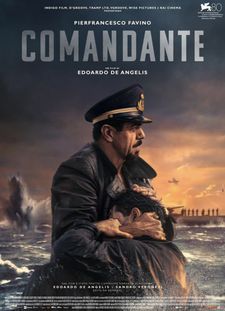 |
| Comandante poster |
EDA: Ah, maybe! To be honest, I never thought to make a war movie. I did it just because I discovered this story. For decades there were submarine movies, but the deepest reason is his powerful decision. That helped me to make the decision to make this movie. I watch movies, but I watch a few movies a lot of times, like an obsessed. Das Boot is one.
AKT: Another personal connection for me - I was actually a tour guide at Bavaria Film Studios, where they had the inside of the submarine that was built for the film. I was giving tours through there! A last question about the end credits and the food! It’s a lovely idea! Sending us off with a long list of foods, because food is connecting, as shown by the fries with the Belgians in your film.
EDA: It’s for this lack of calumet. I was very fascinated by the idea that people can make peace eating together. They can make peace eating a potato. And then about lists! [Co-writer] Sandro Veronesi and me are very obsessed by lists. Because in a list there’s a link to prayer. And praying helps you to evoke something that is not there. It’s not just you. So when I suffer hunger, I evoke something I don’t have, like food very well made. So I wanted to put at the end of the movie this idea of food in peace.
The 23rd edition of Open Roads: New Italian Cinema took place from May 30 through June 6.





















